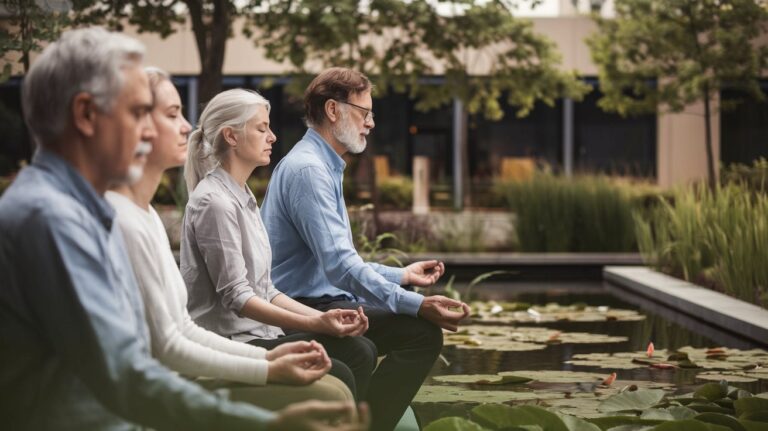Aging is a natural process, but it often comes with concerns about cognitive decline. Seniors may experience memory loss and reduced cognitive capacity, but mindfulness practices, such as meditation, are proving to be valuable tools for supporting brain health. Meditation is increasingly recognized as a simple and accessible way for older adults to improve cognitive function, enhance memory, and promote mental well-being.
The Science Behind Meditation and Brain Health
Meditation works by calming the nervous system and shifting focus away from stress, which can lead to measurable changes in brain structure. Studies suggest meditation can:
- Increase the Size of the Hippocampus: This brain region, responsible for memory and learning, can grow with regular meditation practice.
- Reduce Cortical Thinning: The cerebral cortex, which naturally thins with age, is better preserved in individuals who meditate regularly.
Additionally, meditation reduces levels of cortisol, the stress hormone. Chronic stress has been shown to impair memory and decision-making, so meditation acts as a buffer, protecting the brain from these effects.
Key Benefits of Meditation for Seniors
- Improved Memory
Mindfulness meditation trains the brain to focus on the present, enhancing memory retention and recall. This is particularly beneficial for seniors experiencing forgetfulness or mild cognitive decline. - Lower Risk of Dementia
Meditation enhances neuroplasticity—the brain’s ability to form new connections—which may help slow the progression of dementia and Alzheimer’s disease. - Emotional Stability
Seniors often face stress, anxiety, or depression due to health or life changes. Meditation fosters calmness and emotional resilience, indirectly supporting cognitive health. - Increased Focus
Regular meditation strengthens attention and concentration, enabling seniors to complete tasks more effectively and stay present in their surroundings. - Better Sleep
Meditation improves sleep quality, essential for memory consolidation and overall brain function.
Types of Meditation for Seniors
- Mindfulness Meditation
This involves focusing on the present moment without judgment. Seniors can practice by observing their breath or their thoughts in a relaxed state. - Guided Meditation
Using audio recordings or live instructors, guided meditation helps beginners ease into the practice. It often focuses on relaxation, visualization, or positive affirmations. - Loving-Kindness Meditation
This practice emphasizes compassion and gratitude, helping improve mood and foster social connectedness. - Movement-Based Meditation
Yoga and tai chi combine meditation with gentle movements, benefiting both cognitive and physical health.
How Seniors Can Start Meditating
- Set Up a Quiet Space
Create a distraction-free environment for meditation. Comfortable chairs or cushions can support good posture. - Begin Small
Start with 5–10 minutes a day and gradually increase the duration as comfort with the practice grows. - Focus on Breathing
Deep, controlled breathing serves as a great anchor for mindfulness and relaxation. - Join a Group
Community classes or online sessions offer guidance, support, and motivation for regular practice. - Stay Consistent
Like any skill, meditation requires regular practice to achieve lasting cognitive benefits.
Supporting Seniors in Meditation
Caregivers and families play a vital role in encouraging seniors to embrace meditation. They can:
- Explain the benefits of meditation.
- Practice alongside seniors to provide support.
- Recommend user-friendly apps like Calm or Insight Timer, specifically designed for older adults.
Conclusion
Meditation is a powerful yet straightforward tool for improving cognitive health in seniors, including those in memory care assisted living settings. By reducing stress, enhancing memory, and promoting emotional well-being, it improves the overall quality of life. Seniors looking to age gracefully while maintaining mental sharpness can benefit immensely by integrating meditation into their daily routines. With consistent practice, meditation provides a pathway to healthier aging and a more fulfilling life.

